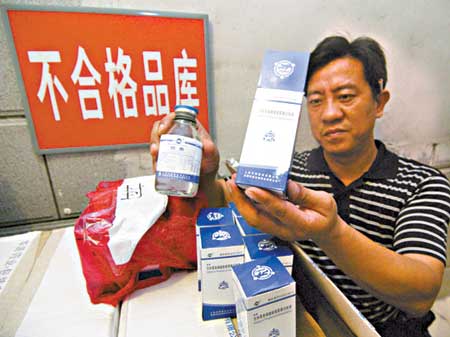Production faults were cited by health authorities yesterday as a major
reason for an antibiotic killing at least seven people nationwide.
|
|

A health worker seals bottles of
potentially hazardous clindamycin phosphate glucose in Loudi, Hunan
Province. More than 1,300 bottles were impounded by local health
authorities yesterday. [China
Daily]
| |
The
output of clindamycin phosphate glucose, manufactured by Anhui Huayuan Worldbest
Biology Pharmacy Co, "failed to follow required technical procedures," said a
spokesman for the State Food and Drug Administration (SFDA).
An investigation team which checked the procedures followed in June and July
when the drug was produced found the company's production records were
incomplete, said the spokesman.
He added that investigations were continuing into the link between adverse
patient reactions and the injection made by the pharmaceutical company in East
China's Anhui Province.
But at a news conference yesterday, Jiang Zuojun, vice-minister of health,
said the "true reason behind the accident has not yet been discovered."
Of the 10 tests conducted on the drug, nine have found nothing wrong; and
results of the final test on possible bacterial infection will be available only
after 10 days, Jiang said.
"If all the tests come back fine, we will have to find other possible reasons
for the problem we are now facing," Jiang said.
He said there is no plan for a blanket ban on the drug which is also made by
other companies since all reports of adverse side effects have so far been
linked to the Anhui firm.
The company produced 3.7 million injection bottles since June, with more than
3.18 million sold in 26 provinces.
More than 755,000 bottles of the drug have been recalled, 185,500 are on
their way to the factory, and more than 161,200 have been sealed.
The SFDA spokesman could not account for the whereabouts of the remainder,
only saying they were scattered in small hospitals, clinics and drugstores in
remote areas, from where it is difficult to retrieve them.
The Anhui company began production of clindamycin phosphate glucose widely
used by grassroots medical institutions to treat bacterial infections in 2001.
The Ministry of Health banned the use of the drug made by Anhui Huayuan
nationwide on August 4 after reports of adverse reactions began to surface. So
far more than 80 patients have developed severe reactions such as chest, kidney
or stomach pains, vomiting and anaphylactic shock after receiving the drug.
The event has drawn attention to overuse of antibiotics in the country. The
drug was introduced in the country in 1970s and was initially used in small
doses in injections. But since the late 1990s, hospitals began to use it in
large doses in drip infusions, according to Guangzhou-based 21 Century Business
Herald.
"A drip infusion usually costs much more than an injection," which means more
profits for pharmaceutical companies, it quoted Sun Zhongshi, a pharmacist at
the National Drug Evaluation Centre at SFDA, as saying.
(China Daily 08/11/2006 page1)